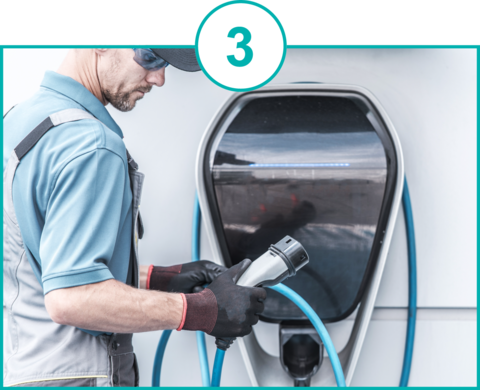Find and Install an
Electric Vehicle Charger
Explore our helpful resources to find a certified electrician and plan for an at-home EV charger installation.


Research & Plan for Home Installation
To prepare for installing an EV charger, first find a certified electrician in your area. Then determine where you want to install your EV charger on your property. Finally, choose an EV charger that works best for your EV make and model.
Although most EVs come with a charger, verify the best charger type with your vehicle manufacturer.
Find a Certified Electrician
Discover local, qualified electricians who will help prepare your home for EV charging.

Complete Permitting & Electrical Infrastructure
Work with your electrician to obtain any required permits. The electrician you select to install a Level 2 charger will coordinate with SDG&E for any equipment and electrical work that may be required at your home.
If the electrician identifies that your electrical panel needs to be augmented, they will contact SDG&E directly regarding a further build-out at your property.
Select a Home EV Charger
Compare types of EV chargers that fit your preferred EV make or model.

Install & Maintain Your EV Charger
After your electrician has properly installed and tested your EV charger, you’re ready to begin charging!
All customers are responsible for the ongoing maintenance of customer-owned infrastructure and equipment.
If you have any questions, contact your EV manufacturer or electrician.

Review Your EV Pricing Plan Options
Once you’ve set up your at-home Level 2 charging station, select an EV pricing plan that works for your household needs, fits your everyday lifestyle and helps you maximize savings when charging at home.
You do not need to install a Level 2 charger to charge your EV at home. All EVs are delivered with a Level 1 charging cord that plugs into a standard, 120-volt electrical outlet.
Because a Level 1 charger is relatively slow (charging approximately five miles per hour), you may choose to install a Level 2, 240-volt charging station — which can charge your EV up to five times faster (charging approximately 25 miles per hour).
If you want to install a Level 2 charging station at your home, consider the following factors:
- Cost — Research the combined costs of purchasing and installing a charging station. On average, a Level 2 charger ranges from $500 to $700; exact cost depends on features such as portability, amperage and WiFi capability. Meanwhile, the cost to install a Level 2 charging station depends on additional equipment, electrical work, metering arrangements and permitting that may be required at your home.
- Portability — Decide whether you prefer a stationary charger that is hardwired and permanently mounted to the wall, or a portable charger that plugs into a 240-volt outlet and hangs on the wall. (A portable charger can also be taken with you if you move.)
- Charging cord length — The further the charger is from your home's utility panel, the more costly its installation will be. To determine your required charging cord length, measure the distance between your charger location and where your car will be parked. Cord lengths range from 12-25 feet.
- Smart connectivity — Smart chargers connect to your WiFi and allow you to program charging times and monitor charging habits from your phone or other device. You may not need an EV smart charger, as most EV drivers can now control and monitor charging through their vehicle’s app.
Want to Save on Your Energy Bill?
Explore EV pricing plan options that fit your driving and energy use preferences.


